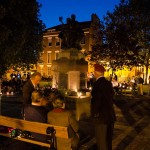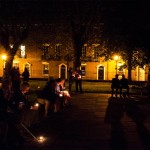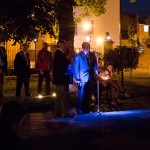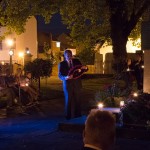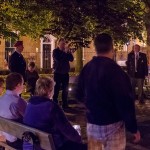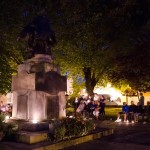
Like everywhere in Britain, Tuesday 4th August 1914 in Bridgwater was a day of excitement and anticipation as the Nation waited to see if the German Army of Kaiser Wilhelm would obey the British Government’s ultimatum to withdraw from Belgium by 11pm. In fact, this war, which had been a long time coming and pretty much expected by everyone, wasn’t going to be stopped, even at the last minute by anyone in any country saying ‘hang about, this isn’t going to end well’. The mincer had been turned on, and it wasn’t going to be turned off until some 17 million people had died, 8,000 of them from Somerset and 380 from Bridgwater.
The War Memorial in King’s Square was erected in 1924 and bears the names of the people of the town who fought and died telling the story of the war and Bridgwater’s role in it.
Bridgwater in 1914 on the Eve of War
In 1914 there were about 16,000 inhabitants in Bridgwater and the town was basically either Eastover or Westover, depending on which side of the river you lived. There were no vast housing estates in Hamp or Sydenham, the rich of the town lived mainly in the villas of Northfields or out of the town in Wembdon whilst the Westover working class lived in the slum courts spreading from West street to Market street, or in newer build houses in Blacklands, Camden rd and Victoria rd.
 Most of the people in Bridgwater worked in the brickyards, on the docks or for the railways and the town had a strong Trades Union tradition. In 1913 this militancy had resulted in the formation of the Trades Council and during 1914 there was an increasing number of large public meetings mainly addressed by Sid Plummer the leader of the DWRGWU (Dockers union that went on to become the T&GWU) along with Ernie Bevin –the Dock Union leader who later became Labour Foreign secretary in 1945. In January 1914 the Socialist politician George Lansbury addressed a Bridgwater meeting expressing the view “The workers of all countries have no quarrel. They are exploited in times of peace and sent out to be massacred in times of war”. His newspaper the Daily Herald maintained probably the most balanced coverage throughout the war. On Sunday August 2nd Lansbury was a key speaker at the 11th hour Trafalgar square anti war demo.
Most of the people in Bridgwater worked in the brickyards, on the docks or for the railways and the town had a strong Trades Union tradition. In 1913 this militancy had resulted in the formation of the Trades Council and during 1914 there was an increasing number of large public meetings mainly addressed by Sid Plummer the leader of the DWRGWU (Dockers union that went on to become the T&GWU) along with Ernie Bevin –the Dock Union leader who later became Labour Foreign secretary in 1945. In January 1914 the Socialist politician George Lansbury addressed a Bridgwater meeting expressing the view “The workers of all countries have no quarrel. They are exploited in times of peace and sent out to be massacred in times of war”. His newspaper the Daily Herald maintained probably the most balanced coverage throughout the war. On Sunday August 2nd Lansbury was a key speaker at the 11th hour Trafalgar square anti war demo.
Workers of the World Fail to Unite
The workers of the world could possibly have united in all lands to prevent the disaster that was coming. But they didn’t. When war was declared it was ‘patriotism’, ‘duty’ and a sense of adventure that took over.
In January 1914 the Bridgwater Peace Society had invited the Mayor David Bradfield to their meeting. Bradfield-in fact the first Mayor ever to be paid a salary (£125 a year) and the only Mayor ever to die in office (later that same year) , was part of the Liberal Party establishment who ran the town and also the Country at this time,told the meeting “I believe in peace, but not peace at any price”. The Liberal establishment was under pressure everywhere in 1914 – not just of working people who wanted a living wage, but the rise of a Labour Party, formed by workers who no longer believed the Liberals had their interests at heart, and also by hordes of angry women Suffragettes who simply wanted the vote, whilst in Ireland a civil war was imminent as Unionists threatened to take up (German) arms to prevent Home Rule . A General Election was due later that year…unless a major war came along and then the country could be united, there’d be no need for troublesome social divisions. Or elections. Indeed Bradfield’s replacement Cllr Francis Haggett remained as Mayor until the end of the war without having to face election.
Bridgwater Wakes up ‘At War’
 On Wednesday August 5th Bridgwater woke up to newspapers, telegrams and notices telling them the years of waiting was over. The Bridgwater Mercury led with “5 Nations at war”, “Great Britain Ready” and “Mobilisation today”. Plus the hopeful “Ireland United and Loyal”.
On Wednesday August 5th Bridgwater woke up to newspapers, telegrams and notices telling them the years of waiting was over. The Bridgwater Mercury led with “5 Nations at war”, “Great Britain Ready” and “Mobilisation today”. Plus the hopeful “Ireland United and Loyal”.
Reservists were being called up as Lord Kitchener announced the need for 500,000 more troops with posters proclaiming “Men of Somerset enlist for the defence of your country”. The West Somerset Yeomanry –the Territorial unit based in and around Bridgwater, was brought into the town and billeted in the pubs while Chief of Police WR Davey, was given the task of purchasing 150 horses for this cavalry force.
Recruitment Drives and Jingoistic Fervour
On Sunday 10th August the weeks excitement reached fever pitched. In the morning the vicar JJ Langham delivered a fire and brimstone sermon at a special ‘Divine Service’ attended by the ‘great and good’ (as they call them) of the town and all the military personel, proclaiming “This is a JUST war to protect the weak” invoking “Honour” and “Duty” and asking for “God’s blessing on their arms”. The congregation ended with ‘Onward Christian Soldiers’, the Yeomanry formed up on the Cornhill and marched with patriotic musical accompaniment along the High street to Penel Orlieu before heading off to Salisbury plain and then off to Flanders.

In contrast that Sunday afternoon the Labour and Trades Unionists assembled on East Quay addressed by Sid Plummer and Ernest Bevin in downbeat mood. Plummer straight away declared “This is in no sense an anti-war meeting” . Bevin denounced the “Greed and ambition of the Kaiser” for causing the war whilst calling on the Government to “help the poor, lest they be exploited now by unpatriotic merchants”.
Labour and the Unions were now firmly behind the war effort. Even better news for the Government, the Suffragettes suspended their actions. In Bridgwater the news came in a letter to the Mercury from Sophia Strangways of Shapwick on behalf of the WPSU alongside an opportunistic advert “Household economy in wartime- Birds, the nutritious custard ‘still sold at the usual price’.
Looking for the Enemy
With a Nation united who could they turn on? A Swedish ship ‘the Ilse’ was impounded in Bridgwater Docks ‘just in case’ while the one German in the town -70 year old Mr Henry Hannack, was dragged before Magistrates but, apart from being found to have a ‘strong foreign accent’ was found to have been living in Bridgwater for 50 years and appeared to be ‘supportive of a British victory and happy to see the Kaiser defeated’.
Recruitment was a doddle. At a massive recruitment meeting on the East Quay Major Archer Shee and Colonel Trevor addressed the people of Bridgwater. Colonel Trevor –whilst he was ‘ sorry that at 58 he couldn’t go to fight himself’ – nevertheless urged everyone else to. “3 miles from here was the site of the last battle on English soil – if you don’t want there to be another one then join up now and do your patriotic duty!!” 20 men signed up on the spot to choruses of ‘Rule Britania’ and ‘God Save the King’. “Let us show that Bridgwater Brick is better than German sausage” shouted the Colonel, possibly delirious with jingoistic excess by this point.
At another recruitment rally at the town hall “Play the man’s Part!” was the call from the top table as another 58 signed up. No voice said anything different. Bridgwater’s one Labour councillor, Joe King added his own contribution “Although my views may differ from others on this platform, I know that in time of war it is the patriotic duty of rich or poor to support the Government and gallant little Belgium”. Three of Joe’s sons were instantly signed up.
The First Bridgwater casualty

Most Bridgwater men who were already in the army were in the Somerset Light Infantry. By mid August they were part of the British Expeditionary force heading for Belgium. Their first action was at the battle of Mons and Le Cateau where they halted the German offensive temporarily to hold the buckling French line and prevent the enemy drive to the channel ports. On 26 August 1914 Bridgwater suffered it’s first casualty of the war. Serving with the 1st Battalion of the SLI at Le Cateau, Private Sidney Smith of West street was killed in action. He was 26 and he had recently written to his family “By the time you get this letter I will be out of England. This will be the last letter I write until it’s over. But I wish you wouldn’t worry mum, I expect I shall crawl out of it somehow.” He left a wife and child.
Dozens of Bridgwater men from the West street slum courts died during the next few years in campaigns all around the world from Flanders to Gallipolli to Mesopotamia–modern day Iraq. Although statistically it’s argued that proportionally officers died in greater percentages than rank and filers, with 12% of all infantry privates killed compared to 17% of all officers , it’s hard to explain these maths in a working class town like Bridgwater where the overwhelming majority of names on the War Memorial are privates.
 The War Through Westover Eyes
The War Through Westover Eyes
The story of World War One can be told in the trail of lives of Bridgwater people across the globe and , although the West street slum courts were demolished in later years, the homes around Westover today of the men who died in that war still stand pretty much as they did in 1914.
In 1915 Britain attempted to knock Turkey out of the war with an invasion at Gallipoli . On 25th May 1915 Able seaman Lawrence Laubo of Penel Orlieu was torpedoed during this action aboard HMS Triumph. Private Victor Pitman of 17 Blacklands, the 18 year old son of Tom and Elizabeth, also died in this failed action as did Lance Corporal Alf Richards aged 21 of 14 Wembdon road.
Private William Caple of 34 Mount street, serving with the Grenadier Guards had been killed at the Battle of Loos on 7th October 1915. He was 29.
In the autumn of 1915 gas was being used by both sides and SLI Private Ernest Lewis – the 21 year old son of Frederick Lewis, of Gloucester Place, Friarn Street, Bridgwater, Bridgwater,died at the first battle of Ypres and was one of the first victims of deadly gas poisoning. He was bought back to the Bridgwater Hospital, but died on 27 October 1915. He had three brothers who served in the war and all three would be badly wounded at the Somme in the following year.
Private Clifford Barber of 86 Friarn street was killed on 24th January 1916 in Basra during a failed attempt to knock the Turks out of the war
On 7th March 1916 Private Lawrence O’Brien of 4 Valetta Place had died near Merville in France

The bloody Somme offensive in the summer of 1916 took many lives including Private Tom Ford of the SLI, from number 15 Court West st on 8th August, Private Austin Hayman of Green Dragon Lane on the 7th November and Private William Hurford aged 23 of Albert street on 18 August at the Battle of Delville Wood. Private Walter Norrish aged 22 of 10 George street had died during one of the wars first tank battles on 16 September 1916 Flers Courcelette. Leonard Rawles of the territorials from 65 Camden rd also died on the Somme as did 17 year old Private William Woodbury of 17 Silver st and Gunner William Young of 39 Albert street.
One of the more famous victims of the Somme battle was Bridgwater rugby star Private Walter ‘Rattler’ Roman, from West street, who had also been in and out of the SLI during his career including a spell in the 1899 Boer war and, as a reservist rejoined for the Great War. Wounded on 28 july 1916, he was returned to Bridgwater where he later died of his wounds and is buried, along with many of the ‘home’ victims in Wembdon road cemetery.
Lance Corporal Fred Durrant of 12 Mount Terrace died in action in Mesopotamia on 29 March 1917 during a campaign which continued through the year and by December had also claimed the lives of Private Alf Iley of 4 Mount street, Private Bill Passmore of 10 Provident Place
In August 1917 the SLI was surrounded along the Menin road and it was during this action that 2nd Lt William Hornsby of 14 Blacklands died on 21 August 1917 at the battle of Inverness Copse.
During the second Battle of Paschendaele on 6th November 1917 Private Charles Cockerell of 7 West Quay was killed.

On 22nd November 1917 Private Ernest Hayshaw and his brother Harry Hayshaw of 68 West street were amongst several Bridgwater men who lost their lives at the battle of Nabi Samwell fighting off a Turkish counter attack intended to retake Jerusalem. Also at Nabi Samwell fell Corporal Henry Tottle of 8 Haswell lane
Petty Officer James Adams of 4 Halesleigh Road was killed on 22 December 1917 by an explosion aboard the HMS Valkyrie aged 34 sweeping German mines from the coast.
Private Harry Bale of 14 Provident Place was killed in the tank battle of Cambrai on 3rd December 1917, along with Sgt-Major Bill Broad of 61 Victoria road, who had earlier survived being wounded at Gallipolli.
In 1918 the Turks were being knocked out of the war following campaigns led by Allenby and TE Lawrence (of Arabia). On 9th April 1918 Sgt Clifford Turner of the SLI died at the Battle of Berukin in Palestine. Clifford had been educated at the Albert street council School and was variously a miner and a professional soldier who had fought throughout the entire war in different campaigns.
In the Spring of 1918 the Germans launched a massive ‘last push’ offensive but were beaten back by British, French and newly arrived US troops . It was during this phase that Private Ernest Parker of 27 Camden road on 22nd March and Private Albert Hill of West Street lost their lives on 26th March at Amiens.
Rifleman John Bell of 1 court Penel Orlieu died on the 8th June 1918 at the battle of Amiens as the Allies took the final offensive to push the Germans out of France.
Elsewhere in Europe British troops were advancing and it was on Driver Albert Rabjohns of 7 Blacklands was killed on 31st July 1918 near Thessalonika in Greece

During the offensive Able Seaman Tom Law, now fighting on land with the Royal Naval Division on 4 September 1918 at the second battle of Arras.
On 8th August 1918 Private Sam Dewdney of 43 Victoria rd, who had joined up via the West Somerset Yeomanry and survived most of the war died to be followed on 29th September by his neighbour 32 year old Rifleman Fred Dowdswell of 54 Victoria road at the Battle of Arras. Artillery Driver Bill Mounsher of 5 Hamp Ward had died assisting the Canadian attack on Caix on 17 August 1918
During this final British advance into Belgium Sgt Henry Duddridge of Taunton road died on 30th September fighting with the machine gun tank corps and was awarded the Belgian Croix de Guerre for his actions.
One of the last Bridgwater casualties of the war was Private Ernest Lucas from 5 Blake Place and of the Medical Corps Field Ambulance who died of his wounds on the battlefield on 21st October 1918.
The last Bridgwater casualty was Coldstream Guardsman Cpl Stephen Reed of 21 Old Taunton rd, husband of Emily, who died on 10th November 1918, one day before the armistice.

